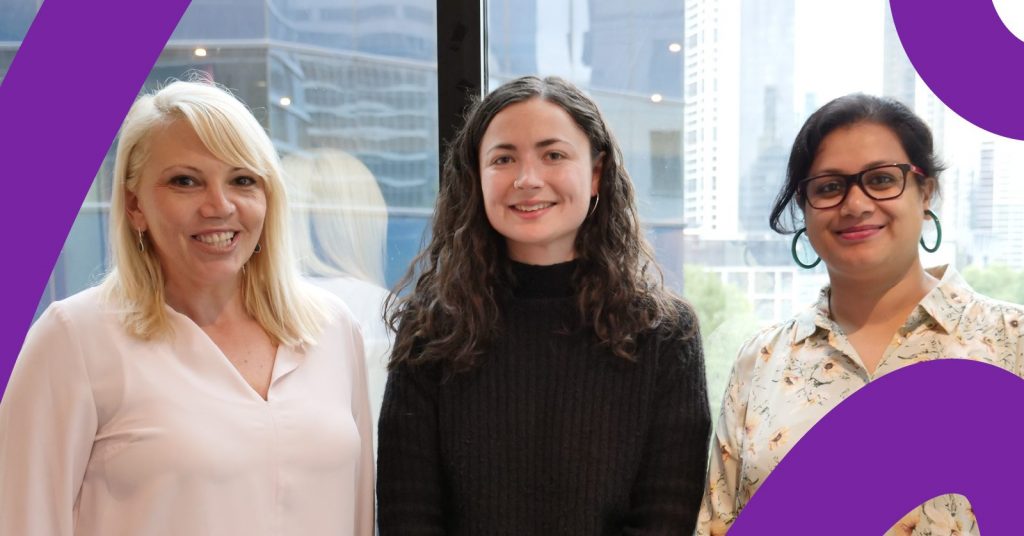Women are at the heart of our sector, making up the majority of both our workforce and the communities that we serve.
International Women’s Day is a time to reflect on and recognise the diverse experiences and stories of some of these women. The Centre is proud to share the perspectives of three of our female staff members working for and with other Victorian women and their families.
For Dr Dakhina Mitra, our Practice Lead for Knowledge Building, International Women’s Day has been a time to reflect on some of the recent headlines surrounding gender equality and family violence.
Recently I read an article that Scotland is set to be the first country in the world to make sanitary products free. While many applauded the idea on social media, there were several people, including women who fielded their displeasure. This shocked women who supported the move – they could not fathom why some women would question something that would be beneficial for other women. To understand this, we have to recognise that patriarchal notions reside in all of us, irrespective of our genders.
On this International Women’s Day, I want to invite everyone to reflect upon gender biases that lie within us and patriarchal notions that shape our thinking. We must understand that violence against women is not a female problem, and patriarchy is not just a male problem. They harm everyone.
The brother of Hannah Clarke (Australia’s most recent case of domestic violence) pointed out that Rowan Baxter was “the type of person that had to win everything, had to be the best at everything, really didn’t like when he wasn’t. He had to control every moment he was in.
Reading this makes me question our parenting attitudes too. How often do we tell our children (all genders) to embrace failure? Do we destigmatise vulnerability? How often do we enable them to respect the word, ‘No’? Do we equip our children with tools to self-regulate and respond to external stressors in a safe manner? Do we teach them empathy? Do we talk to them about gender equity? As adults we have a responsibility towards all children, directly or indirectly. Therefore, I hope that we can ask ourselves these questions and support the next generation to be free from gender stereotypes.
For Glenda Quinn, our Shares Lives Lead, today is important for acknowledge the hard working women across all sectors.
I love working here at the Centre, with our women management to lead the way with their incredible expertise and wisdom. So inspirational! Most women are natural nurturers, so I feel we/they bring that to their role on every level. We are also great multi taskers!!
But on her mind are still the challenges for children and families at present:
Drugs, the exposer on our children in our community right now is dominating our children’s court system and therefore OOHC, with numbers doubling previous years. More rehab programs should able to help parents. Even family units where the children can remain with their parents in this time of need in a supported way.
For Ella Perry our Research to Practice Officer, this day is a day to reflect on her own experience, privilege and generation.
International Women’s Day is important to me because it is a time to celebrate how much has been achieved in improving women’s lives. When I think about the lives of my mother, my grandmother and those who came before them, I feel lucky to have been born in a generation that benefits from greater freedom to have control over my body, my finances and my voice. I remember that these freedoms have been hard won by those who came before me, and I am grateful for their work in getting us here.
But International Women’s Day is also a time that I reflect on how much still needs to be done. As a white, cisgender, middle-class woman I know that I experience a lot more freedom and privilege than many other women. We must be aware of the ongoing need to fight for all women – including Indigenous women, queer and gender diverse women, women with disabilities and women who live with poverty and financial stress. Our journey towards a world gender equality must centre and amplify their diverse experiences.
Gender equality forms a backdrop for all the work we do here at the Centre. Our focus on improving the lives of families inevitably also means improving the lives of women – because, most often, family care work still largely falls to women in our society. When families are struggling, women tend to bear the brunt of that struggle.
In advocating for the needs of women and their families, the Centre also signals that the so-called ‘women’s work’ of raising children is a real and valuable work. We know that family care work is the glue that holds our society together, and that it allows children to thrive as they grow into adults. We advocate for governments to recognise the importance of this family care, and to guarantee a supportive social safety net for the women (and some men) who perform it.
I am hopeful that the next generation can go even further in unpacking the unequal gender roles that restrict all of us, both men and women. I hope that future generations have a free and fluid understanding of gender – and that they live in a society that encourages this.






